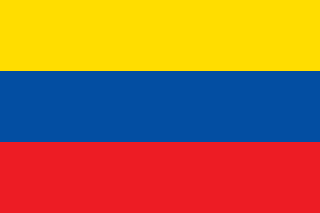
Ecuador, officially the Republic of Ecuador, is a country in northwestern South America, bordered by Colombia on the north, Peru on the east and south, and the Pacific Ocean on the west. Ecuador also includes the Galápagos Islands in the Pacific, about 1,000 kilometers (621 mi) west of the mainland. The country's capital is Quito, but its largest city is Guayaquil.
The History of Ecuador covers human habitation in the region reaching back 8,000 years.

Barcelona Sporting Club is an Ecuadorian sports club based in Guayaquil, known best for its professional football team. Internationally known as Barcelona de Guayaquil, in Ecuador it is simply referred as Barcelona, El Idolo (BSC) or Los Canarios. They currently play in the Ecuadorian Serie A, the highest level of football in the country, and hold the distinction of being the only club in the Ecuadorian top flight to not have played in the Serie B.

Álvaro Fernando Noboa Pontón is an Ecuadorian businessman and politician. He is the father of the incumbent president, Daniel Noboa.

The history of the Republic of Ecuador from 1830 to 1860 begins with the collapse of the nation of Gran Colombia in 1830, followed by the assassination of Antonio José de Sucre and the death of Simón Bolívar from tuberculosis the same year. Heartbroken at the dissolution of Gran Colombia, Bolívar is quoted to have said shortly before his death, "America is ungovernable. Those who have served the revolution have plowed the sea." These words would seem prophetic during the chaotic first thirty years in the existence of Ecuador.
Ecuador is a country in South America.

Guillermo Alberto Santiago Lasso Mendoza is an Ecuadorian businessman, banker and politician who served as the 47th president of Ecuador from 2021 to 2023. He was the country's first conservative president in nearly two decades, marking a shift in the country's electorate.
Terrorism in Ecuador is a rare occurrence as the country, despite recurrent periods of economic and political instability, has

Annabella Emma Azín Arce is an Ecuadorian politician, doctor of medicine, and wife of Álvaro Noboa. She has four children, including President of Ecuador Daniel Noboa.

Isabel Noboa Pontón de Loor is an Ecuadorian businessperson, the founder and chief executive officer of the Nobis Consortium, one of the largest business groups in Ecuador. She is considered one of the most prominent women entrepreneurs in Latin America, and is known for philanthropic initiatives.
Omar Quintana Baquerizo was an Ecuadorian politician, sports executive, businessman, and member of the Ecuadorian Roldosist Party (PRE) and Institutional Renewal Party of National Action (PRIAN) political parties. Quintana served in the former National Congress of Ecuador from 2003 to 2005, including a tenure as the President of the National Congress from January 5, 2005, until April 20, 2005.
Events in the year 2021 in Ecuador.
The September 2021 Guayaquil prison riot occurred at the Litoral Penitentiary in Guayaquil, Ecuador on 28 September 2021. At least 123 inmates were killed and several others were injured in the riot that took place in that prison. It was the deadliest prison fight in the country's history and one of the deadliest in Latin American history.
Los Choneros is an organized crime syndicate and drug cartel based in the city of Guayaquil, Ecuador, with a notable presence along much of the country's coastline. The gang is known for its involvement in organized crime, including drug trafficking, extortion, and robbery. Many of its members have been on the Ecuadorian most wanted list and its original leaders have been imprisoned or killed. Their main business is moving cocaine to the United States.

Events in the year 2023 in Ecuador.

Daniel Roy Gilchrist Noboa Azín is an Ecuadorian politician and businessman currently serving as the 48th president of Ecuador since 23 November 2023. Taking office aged 35, he is the second youngest president in the country's history, after Juan José Flores, and the youngest to be elected.
Events in the year 2024 in Ecuador.
Rear Admiral Jaime Vela Erazo is an Ecuadorian military leader. He is the commander of the Armed Forces of Ecuador.
Los Chone Killers, or Chone Killers, are an Ecuadorian criminal and terrorist organization known for their drug trafficking activities, assassinations, and other crimes. The group split from Los Choneros in 2020, along with Los Lobos and Los Tiguerones following the murder of Los Choneros leader Jorge Luis Zambrano. The group mainly operates in Guayas Province, in particular the city of Durán.
Los Tiguerones are an Ecuadorian crime syndicate that specializes in drug trafficking activities, assassinations, and other crimes. The group split from Los Choneros in 2020, along with Los Lobos and Los Chone Killers following the murder of Los Choneros leader Jorge Luis Zambrano. The group is based in Esmeraldas.
![Barricades in the hospital [es] of Los Ceibos [es] in the north of Guayaquil Barricadas en el Hospital Ceibos durante el ataque del 9 de enero.jpg](http://upload.wikimedia.org/wikipedia/commons/thumb/6/67/Barricadas_en_el_Hospital_Ceibos_durante_el_ataque_del_9_de_enero.jpg/220px-Barricadas_en_el_Hospital_Ceibos_durante_el_ataque_del_9_de_enero.jpg)








